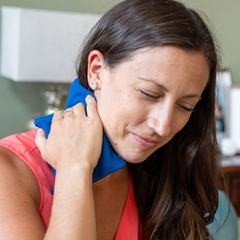- Back and Spine
- Bone and Joint Health
- Health Topics
- Joint Conditions/Injuries/Treatment
- Joint Pain/Pain Management
A Pain In the Neck? It Could Be a Herniated Disc

Answer a few questions and we'll provide you with a list of primary care providers that best fit your needs.
That sharp, stabbing pain in your neck — or lower back — could be triggered by a herniated disc.
The spine is made up of bones called vertebrae. Between each vertebra are soft, spongy discs. They work like shock absorbers and keep the spinal bones in place.
But with age or injury, these discs can break down or even rupture. When this happens, it’s called a herniated disc. You may also hear it referred to as a ruptured, slipped, or bulging disc. These discs become a problem when they push against a nerve or the spinal cord, causing neck or back pain that can range from mild to severe.
The good news? Most people feel much better with just a few months of simple, nonsurgical treatments.
Who Is At Risk For a Herniated Disc?
Conditions that can weaken the disc and put you at higher risk of getting a herniated disc include:
- Being middle-aged or older
- Improper lifting or lifting heavy objects
- Being overweight, which puts extra stress on lower back discs
- Sudden pressure
- Repetitive strenuous activities, especially bending or twisting
- Regularly sitting in the same position for a long time
- Living an inactive lifestyle
- Smoking
- Genetics, the likelihood of getting a herniated disc can run in families
The good news? Most people feel much better with just a few months of simple, nonsurgical treatments.
What Are the Symptoms Of a Herniated Disc?
When a disc presses on a nerve, it usually causes pain, often on one side of the body. Symptoms vary depending on where the disc has herniated, and how big the herniation (bulge) is.
 Lower Back (Lumbar Spine)
Lower Back (Lumbar Spine)
Low back pain affects a lot of people. The most common symptom of a herniated disc is sciatica - a sharp, shooting pain that radiates from the buttocks down the back of the leg. This happens when the disc pushes on the sciatic nerve, which runs down your leg. Other symptoms include:
- Off-and-on again or continuous back pain
- Weakness, tingling or numbness in the leg and/or foot
- Spasm of the back muscles
- Loss of bladder or bowel control — a rare condition that requires immediate medical attention
Neck (Cervical Spine)
Just like back pain, neck pain is also common. When pressure pushes on a nerve in the neck, it generates pain in the muscles between your neck and shoulder. Symptoms also include:
- Weakness, tingling, or numbness in one arm
- Burning pain in the shoulders, neck, or arm
If you have any of these complaints, make an appointment to see your doctor.
How Is a Herniated Disc Diagnosed?
Pain alone is not enough to signal a herniated disc. Your doctor will give you a physical exam and get your medical history. You may also need one or more of these tests to confirm the diagnosis:
- X-ray. A test that uses radiation to produce an image of the vertebrae structure and joint outlines
- MRI (magnetic resonance imaging). A test that produces 3-D images of body structure and organs using powerful magnets and computer technology
- Myelogram. A procedure that uses dye injected into the spinal canal to make the structure clearly visible on X-rays
- CT (computerized tomography). An imaging procedure that uses X-rays and computer technology to make detailed images of the body, including the spinal canal
- EMG (electromyography). A test that measures the electrical impulse along nerve roots, nearby roots, and muscle tissue. It can show ongoing or past nerve damage.
How Is a Herniated Disc Treated?
Luckily, most herniated discs don’t require surgery. They will get better in four to six weeks by following one or more of these simple measures:
- Rest. Cut back on activities for a few days.
- Move safely. Learn how to stand, sit, and lift correctly.
- Medication. Your doctor may recommend an over-the-counter pain medicine or prescribe a muscle relaxant or a narcotic if the pain is severe.
- Physical therapy. Certain exercises can make your back and stomach muscles stronger and ease pain.
- Steroid injections. Your doctor may give you steroid injections, which reduce swelling and lessen pain.
- Cold compresses or ice. They can be applied several times a day for up to 20 minutes at a time.
- Gentle heat. Use after spasms stop.
- Maintain a healthy weight. Extra weight, especially around your midsection, can strain your lower back.
- Quit smoking. Smoking is a risk factor for atherosclerosis (hardening of the arteries), which can cause lower back pain.
Only a small percentage of patients who have a herniated disc need surgery. If nonsurgical treatments don’t reduce or eliminate your pain, your doctor may recommend surgery. The surgeon will remove all or part of the damaged disc, so it no longer presses on the nerve.
Answer a few questions and we'll provide you with a list of primary care providers that best fit your needs.
Sources: American Academy of Orthopedic Surgeons; American Academy of Family Physicians; American Association of Neurological Surgeons




